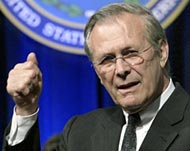US intelligence bill runs into obstacles
A massive US intelligence reform bill has hit a snag after a key congressional ally of the Pentagon expressed concern about the measure.

House Speaker Dennis Hastert pulled the Intelligence Reform and Terrorism Prevention Act of 2004 off the floor minutes before a scheduled vote, citing concerns expressed about the legislation by Duncan Hunter, the powerful chairman of the House Armed Services Committee.
“Duncan was concerned that the proposed reform could endanger our troops in the field, who use real-time intelligence to fight the war in Iraq and Afghanistan,” Hastert said.
“We need to clarify it; we need to work on it. We will continue to do that.”
Hastert declined to predict when the objections would be overcome.
Powerful intelligence tsar
|
“This episode lays bare the intransigent, my-way-or-the-highway approach that infects this House Republican majority, which seems to regard any attempt at bipartisan compromise with derision and scorn rather than as an opportunity for real legislative achievement” |
The sudden reversal followed an announcement by House-Senate negotiators announced a sweeping deal on the legislation that calls for the creation of a national intelligence tsar with sweeping budgetary powers.
Under the accord, the tsar would be responsible for directing, overseeing and managing all 15 agencies making up the US intelligence community and would operate separately from the director of the Central Intelligence Agency.
But the agreement also meant a reduction of the clout wielded by the secretary of defence, who currently controls up to 80% of the intelligence budget.
Defence Secretary Donald Rumsfeld has repeatedly expressed concern that the proposed reform could hurt rather than help the intelligence community.
Hunter, one of the most conservative members of the US congressional leadership, who represents a district outside San Diego, California, is a key Rumsfeld ally on Capitol Hill.
‘Security bill dead’
House Democratic Whip Steny Hoyer said Saturday’s move has essentially killed intelligence reform for this year and blamed “extremist House Republicans” for the collapse of the accord.
 |
|
The bill would have seen less |
“This episode lays bare the intransigent, my-way-or-the-highway approach that infects this House Republican majority, which seems to regard any attempt at bipartisan compromise with derision and scorn rather than as an opportunity for real legislative achievement,” Hoyer said in a statement.
Negotiations to reach a compromise were launched after the Senate and the House of Representative passed vastly different versions of the bill that were also loaded with controversial immigration and homeland security provisions.
The accord between the two chambers also called for establishing an effective national counterterrorism centre to coordinate and unify all elements of counterterrorism intelligence operations planning.
It also called for the creation of an independent privacy and civil liberties board with access to all government agencies to make sure citizens’ rights were not violated in the course of the “war on terror”.